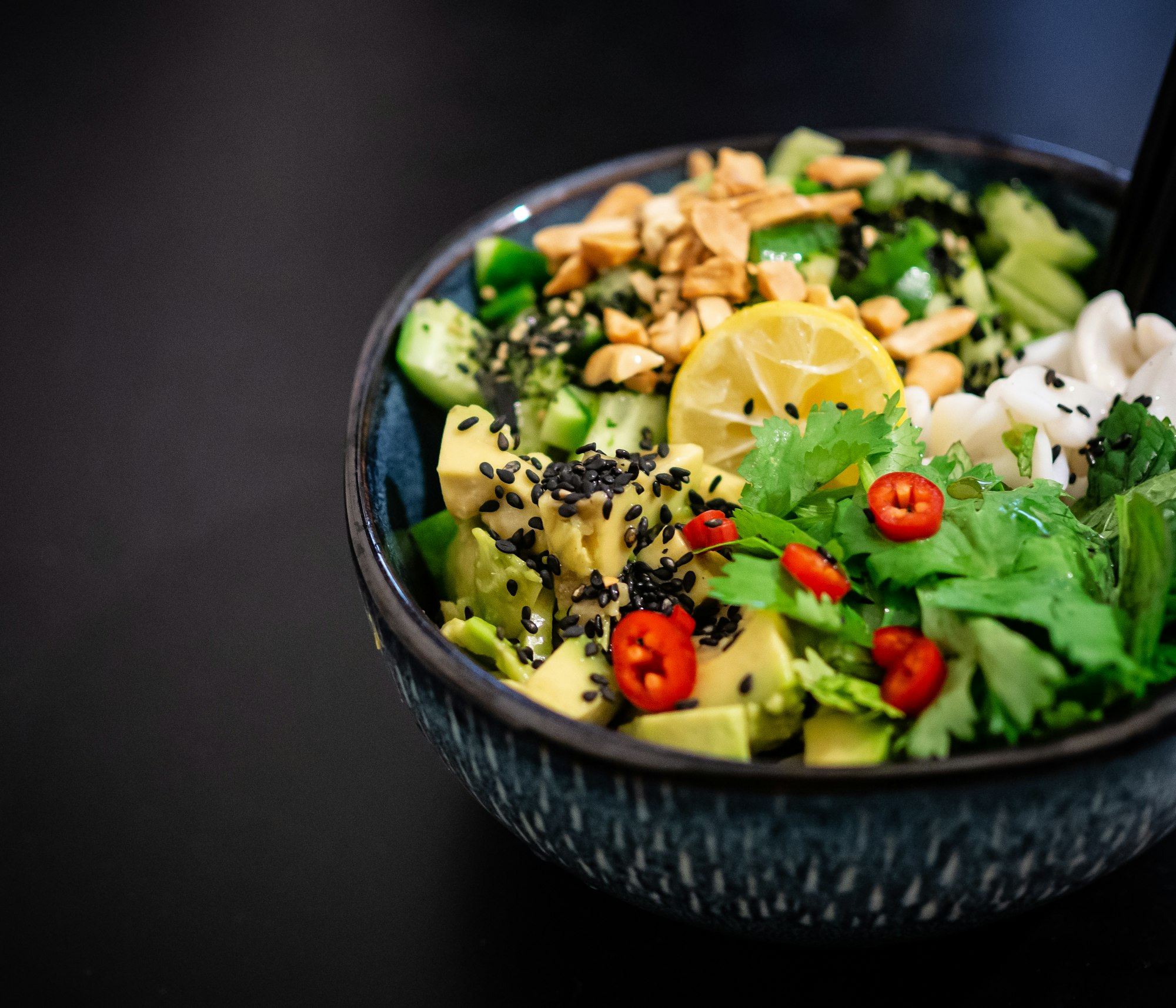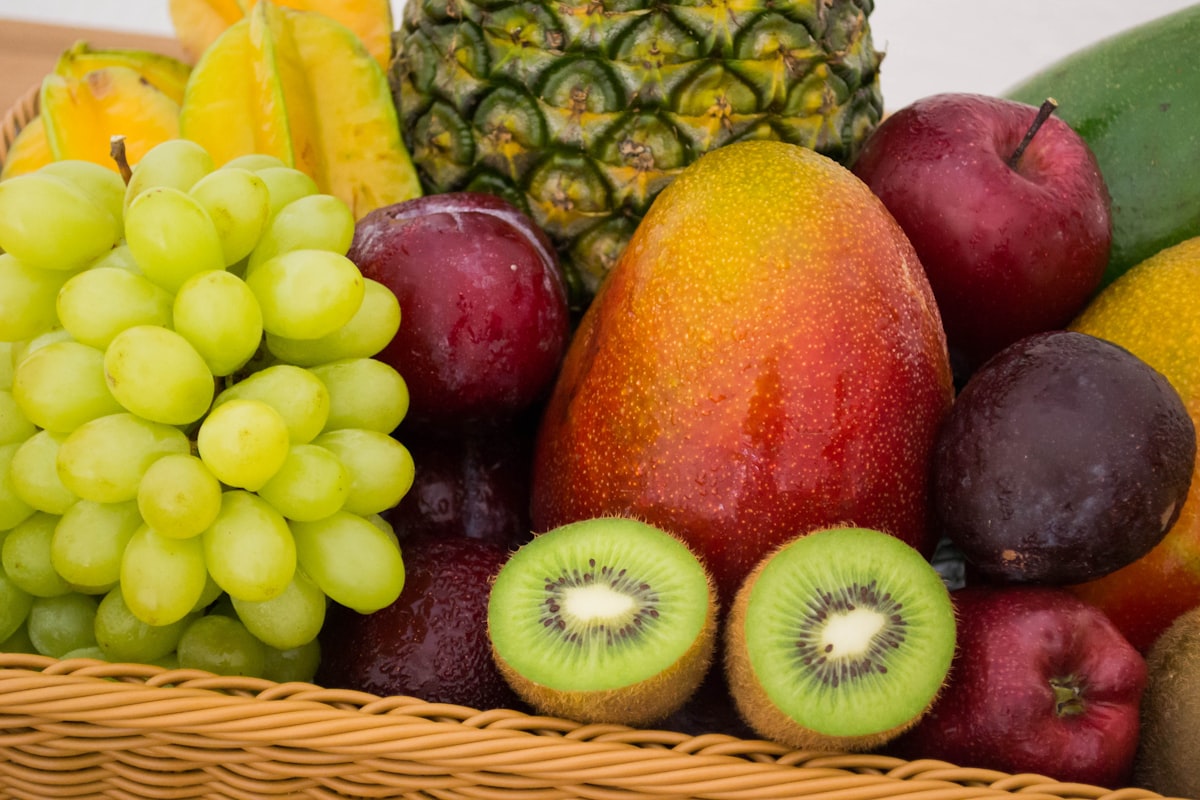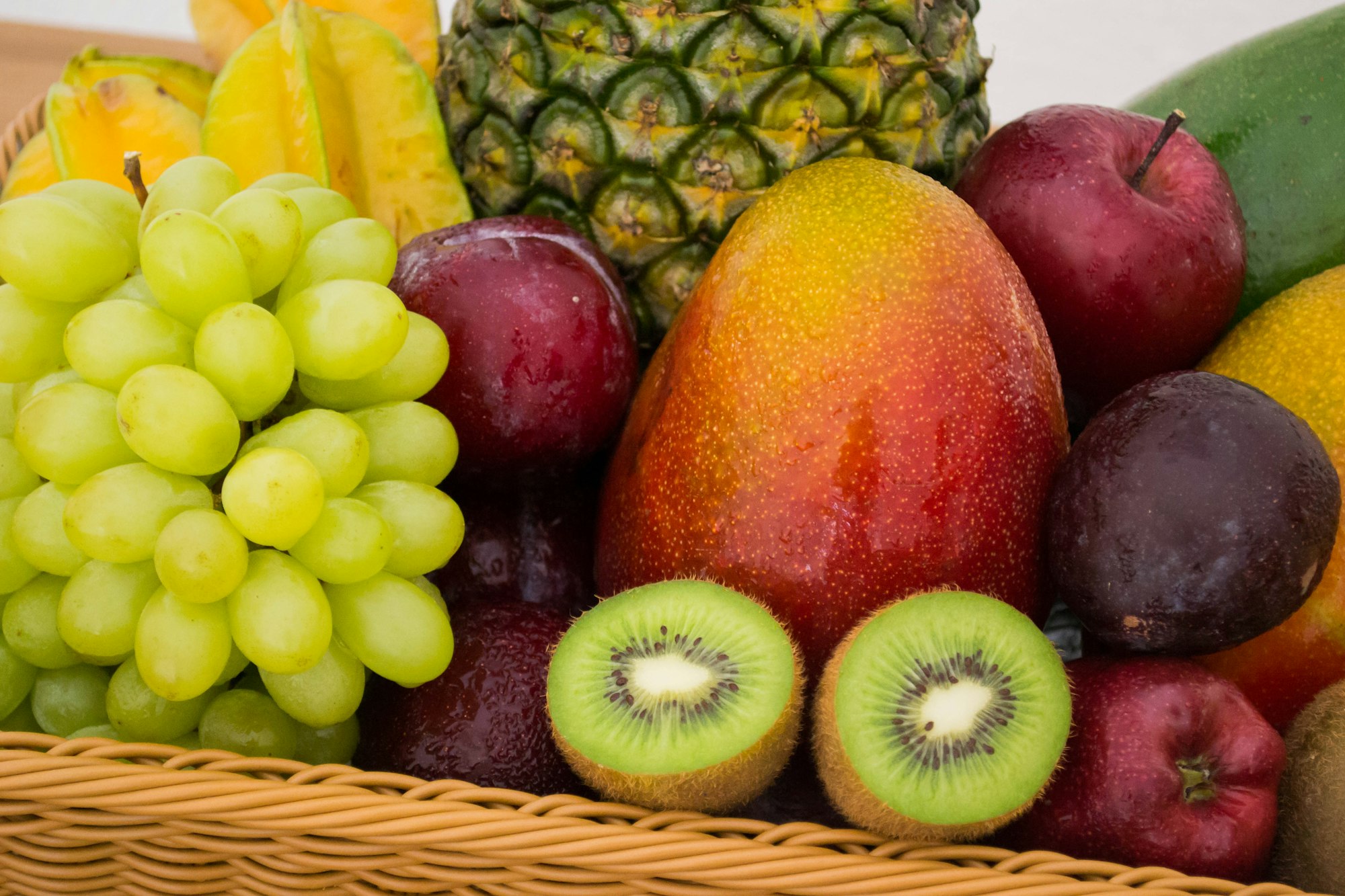Content Summary
Quercetin is a natural plant compound known as a flavonoid, which is found in a variety of fruits, vegetables, and grains. With its potent antioxidant and anti-inflammatory properties, quercetin has garnered attention for its potential health benefits.
In this article, we will point to the numerous advantages of quercetin and highlights the foods that are rich in this beneficial compound. Additionally, we discuss the use of quercetin supplements and their potential benefits.
Health Benefits of Quercetin:
Powerful Antioxidant: Quercetin acts as an antioxidant, neutralizing harmful free radicals and protecting cells from oxidative stress. By combating free radicals, it may help reduce the risk of chronic diseases, such as heart disease, cancer, and neurodegenerative disorders.
Anti-Inflammatory Effects: Quercetin possesses anti-inflammatory properties that can help mitigate inflammation in the body. It may aid in reducing inflammation associated with conditions like arthritis, allergies, and inflammatory bowel disease.
Immune System Support: Quercetin exhibits immune-modulating effects, helping to regulate immune responses. It may enhance the function of immune cells, potentially boosting the body's defense against infections and promoting overall immune health.
Cardiovascular Health: Research suggests that quercetin may promote heart health by improving blood vessel function, reducing blood pressure, and lowering LDL cholesterol levels. These effects may contribute to a decreased risk of cardiovascular diseases.
Allergy Relief: Quercetin has been studied for its potential to alleviate allergy symptoms. Stabilizing mast cells, may reduce the release of histamine and mitigate symptoms such as sneezing, itching, and congestion.
Cognitive Function: Some studies indicate that quercetin exhibits neuroprotective properties and may support cognitive function. It can help protect brain cells from oxidative stress and inflammation, potentially reducing the risk of cognitive decline and neurodegenerative diseases.
Foods Rich in Quercetin:
Quercetin can be obtained through a diverse range of plant-based foods. Here are some examples of foods that are excellent sources of quercetin:
Onions: Red onions, especially, are known for their high quercetin content. Enjoy them raw in salads or add them to cooked dishes for a flavor boost.
Apples: Apples, particularly their skins, contain significant amounts of quercetin. Snack on fresh apples or incorporate them into recipes like pies, smoothies, or oatmeal.
Berries: Berries such as blueberries, strawberries, and cranberries are rich in quercetin. Include them in your diet as a snack, in smoothies, or as a topping for yogurt or cereals.
Citrus Fruits: Citrus fruits like oranges, lemons, and grapefruits provide quercetin. Squeeze fresh citrus juices or enjoy them as a refreshing snack.
Leafy Greens: Vegetables such as kale, spinach, and broccoli contain appreciable amounts of quercetin. Incorporate these nutrient-rich greens into salads, stir-fries, or smoothies.
Grapes: Red and purple grapes, including their skins, are a good source of quercetin. Enjoy them as a snack or include them in fruit salads and desserts.
Quercetin Supplements:
Quercetin supplements are available in various forms, including capsules, tablets, and powders. While obtaining quercetin from natural food sources is ideal, supplements can be a convenient option.
However, it is essential to exercise caution and consult with a healthcare professional before starting any new supplements. They can provide guidance on proper dosage, potential interactions with medications, and suitability for your specific health needs.
Author's Choice of Quercetin Supplements:
Quercetin 1000mg Zinc 50mg Vitamin C 1000mg Vitamin D 5000 IU Bromelain Elderberry
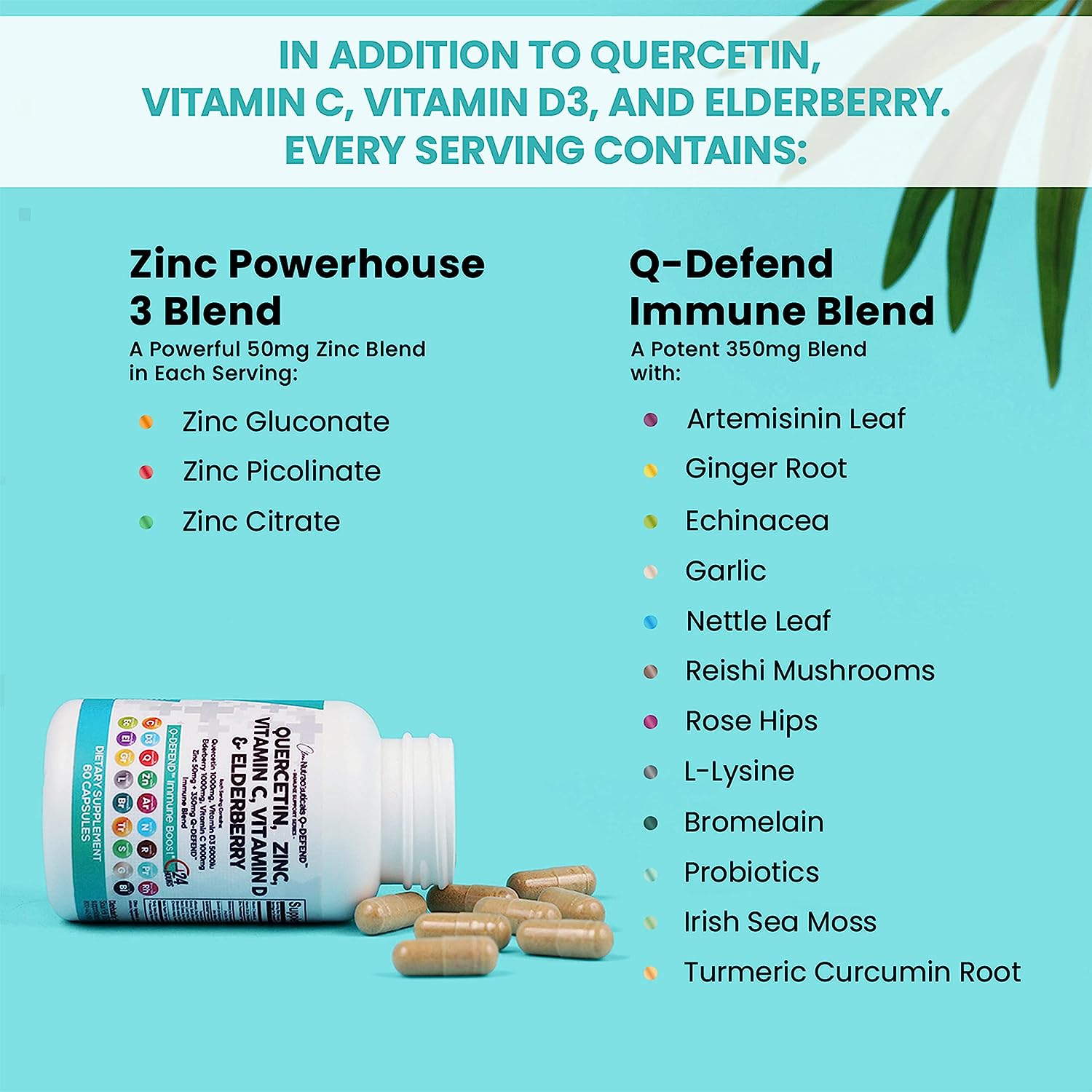
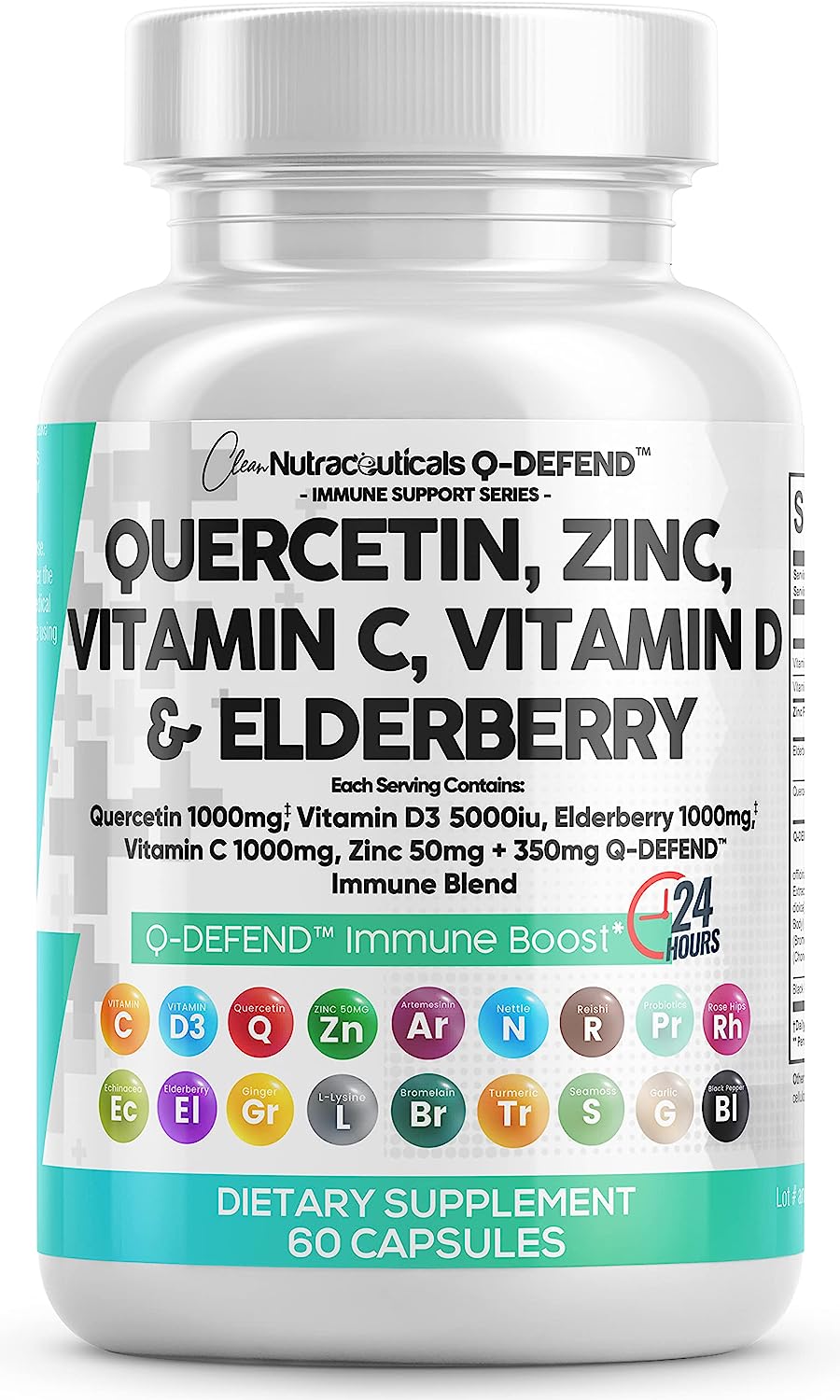
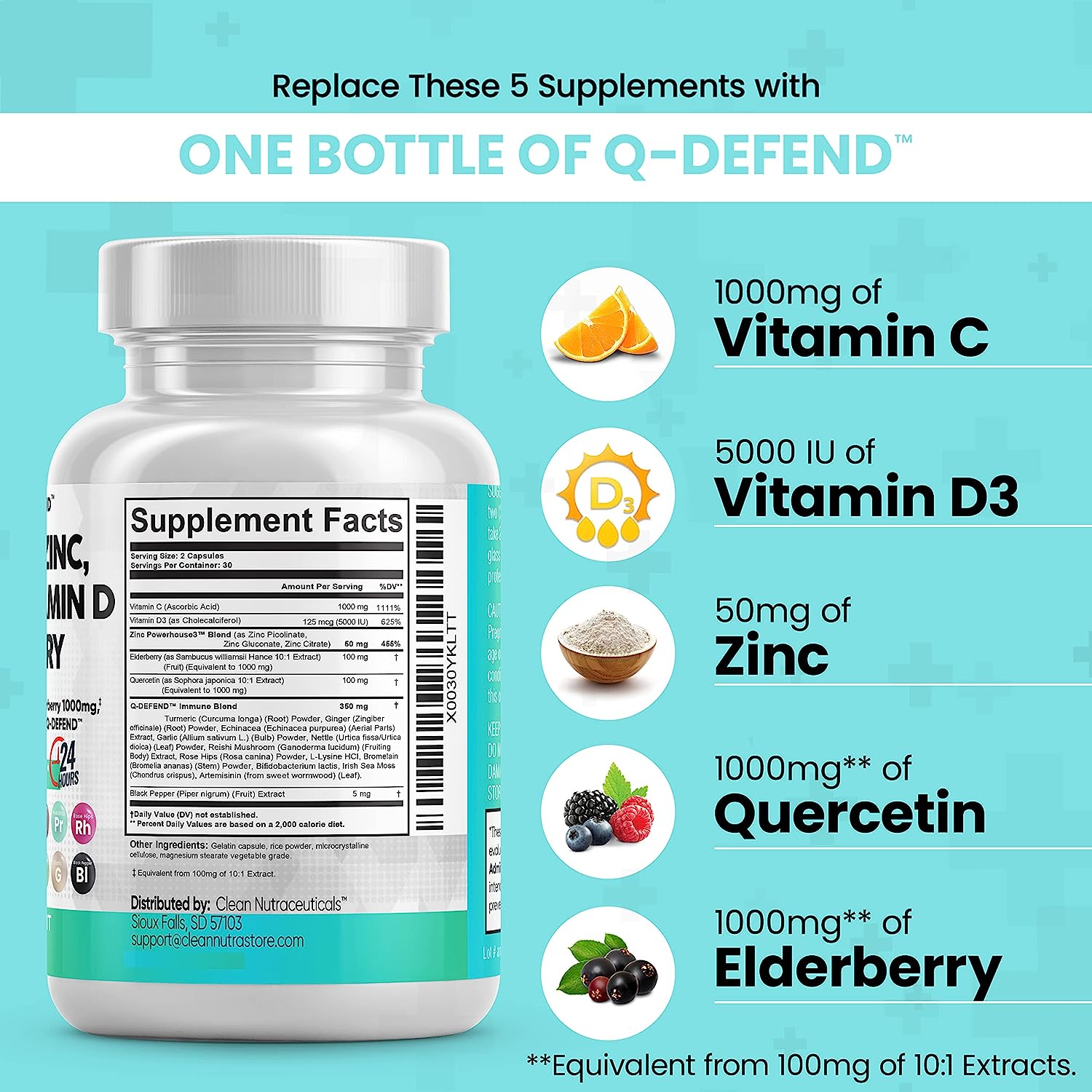
- Q-Defend Immune Support Complex - 18 in 1 immunity complex comes in a convenient 30 serving bottle, meaning our essential ingredients will help keep you well and healthy for a whole month!
- This blend will not only bolster your immune system, but will also aid in assisting respiratory health, inflammation levels, gut health, joint health, and more!
- Rapid Absorbing For Immediate Support - Don't settle for slow absorbing gummies, powders, and tablets that take forever to take effect or come packed with sugar.
- This complete immune support for adults is formulated with black pepper extract, ensuring that these powerful immune system-supporting ingredients go to work fast, protecting you from seasonal ailments, while bolstering your body for months to come.
- Q-Defend Immune Blend contains essential ingredients plus turmeric, echinacea, ginger root, garlic powder, nettle, reishi mushroom, rose hips, bromelain, and even Irish sea moss! The powerful formula offers 18 hand-selected ingredients that have been shown to improve your overall health in a variety of ways! Powerful Support When You Need It Most
ForestLeaf - Quercetin 500mg - Quercetin with Bromelain, Vitamin C & Sting Nettle
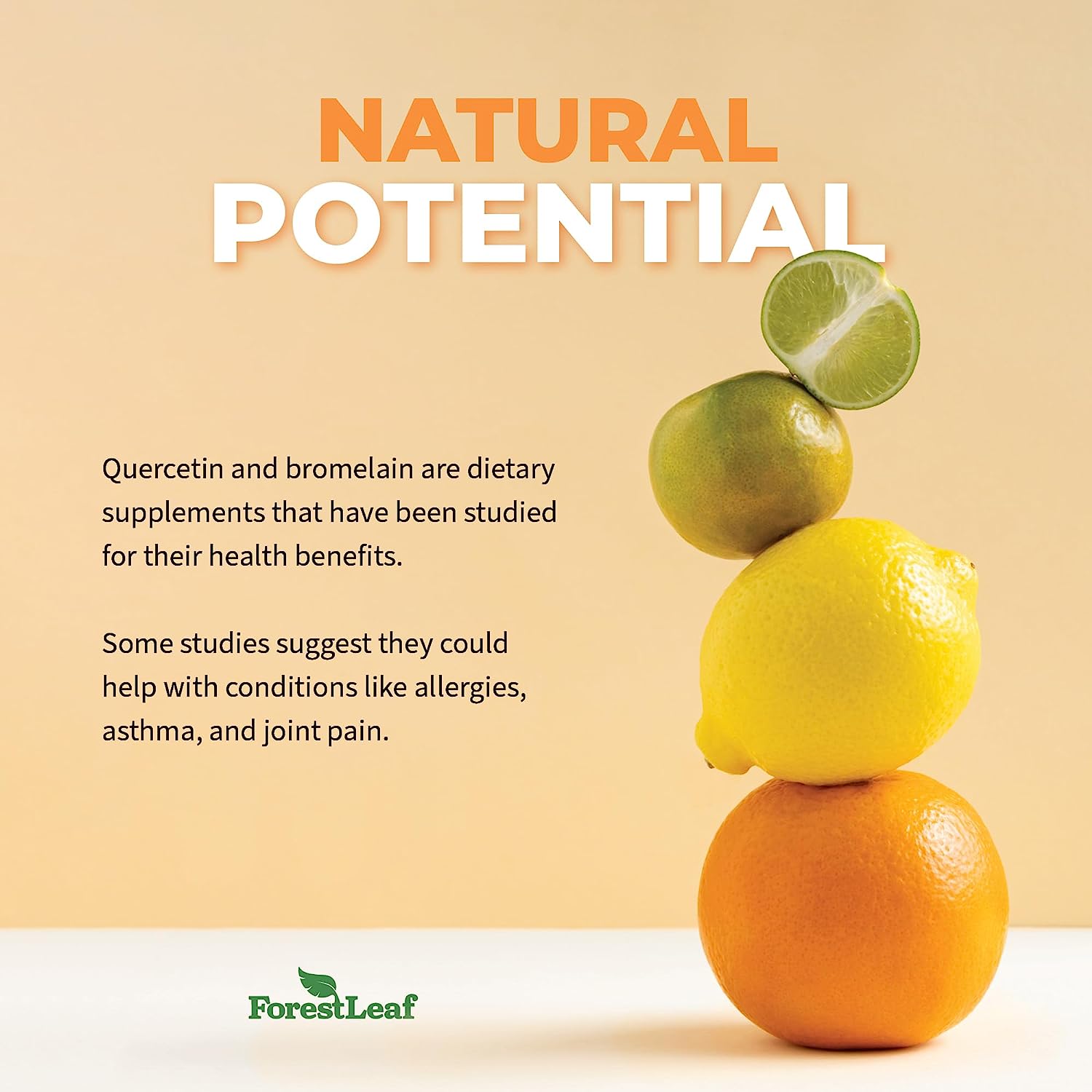
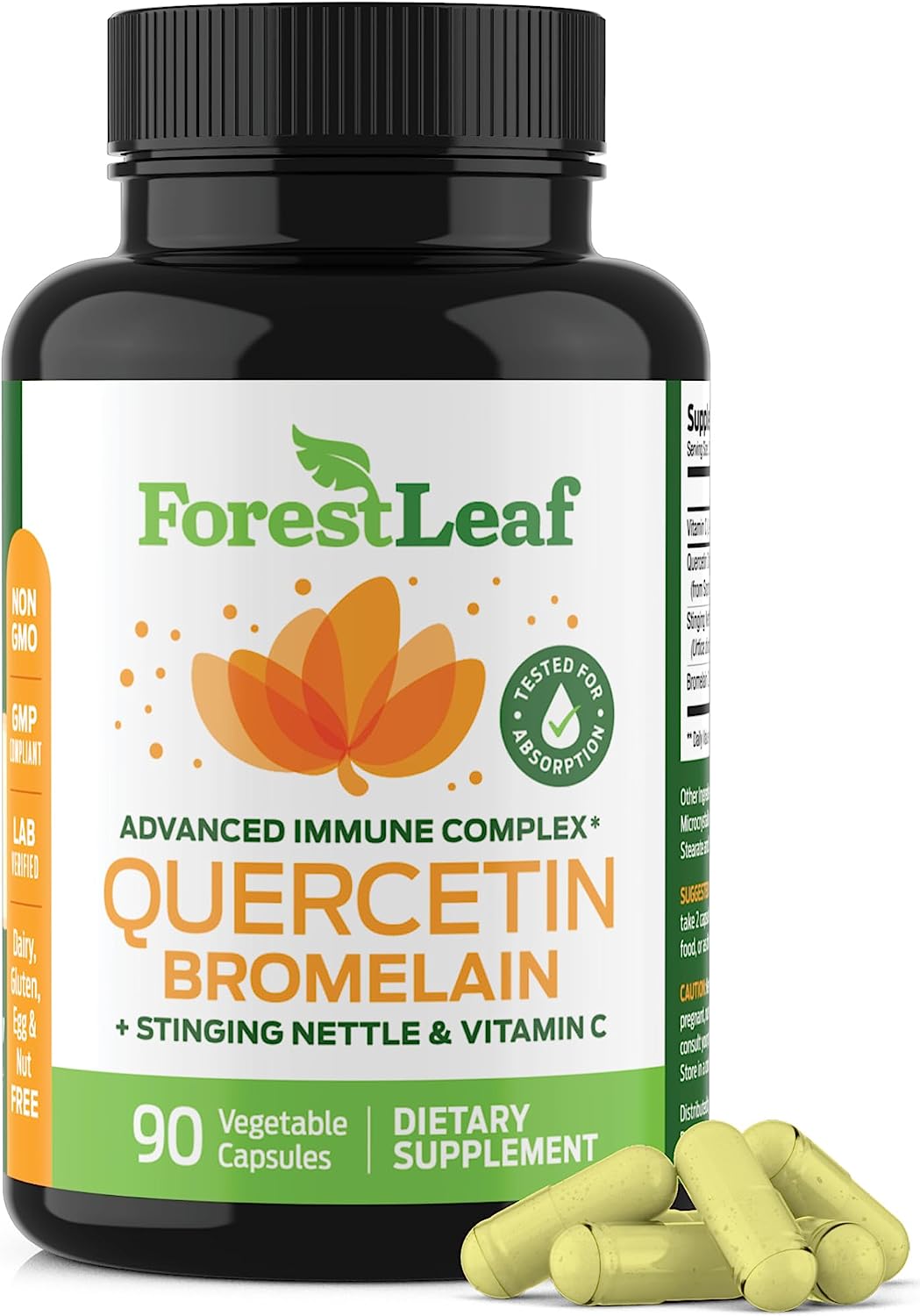

- ALLERGY & IMMUNE FORMULA - Quercetin 500mg with Bromelain, Stinging Nettle and Vitamin C
- POTENT ABSORPTION - Bromelain from pineapple for enhanced absorption.
- Vitamin C 200mg and Stinging Nettle 500mg
- ULTIMATE SUPPORT - promoting overall health and well being.
- FOREST LEAF SUPPLEMENTS - Made in USA, Non GMO, Vegetarian
Solgar Quercetin Complex with Ester-C Plus
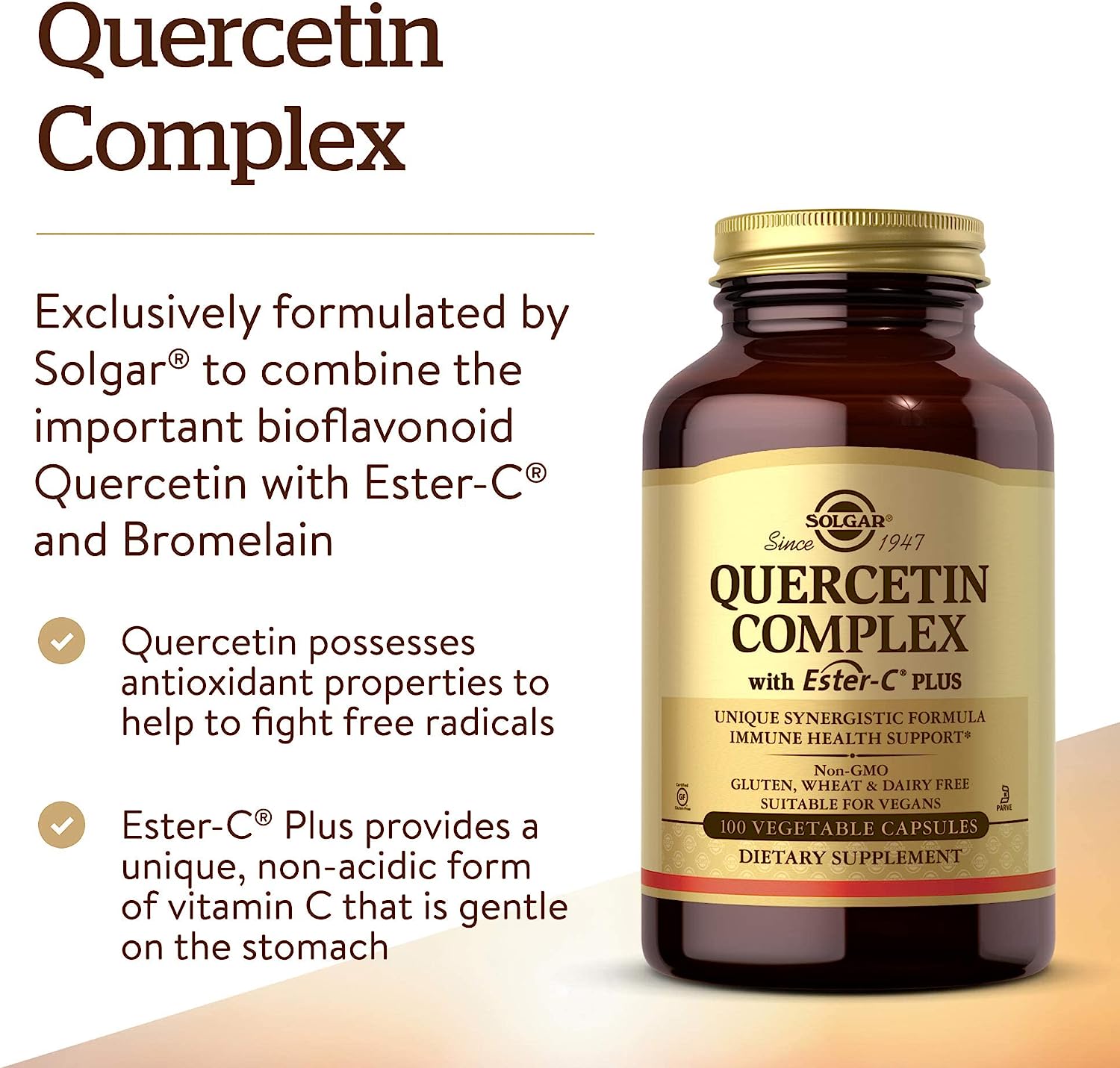
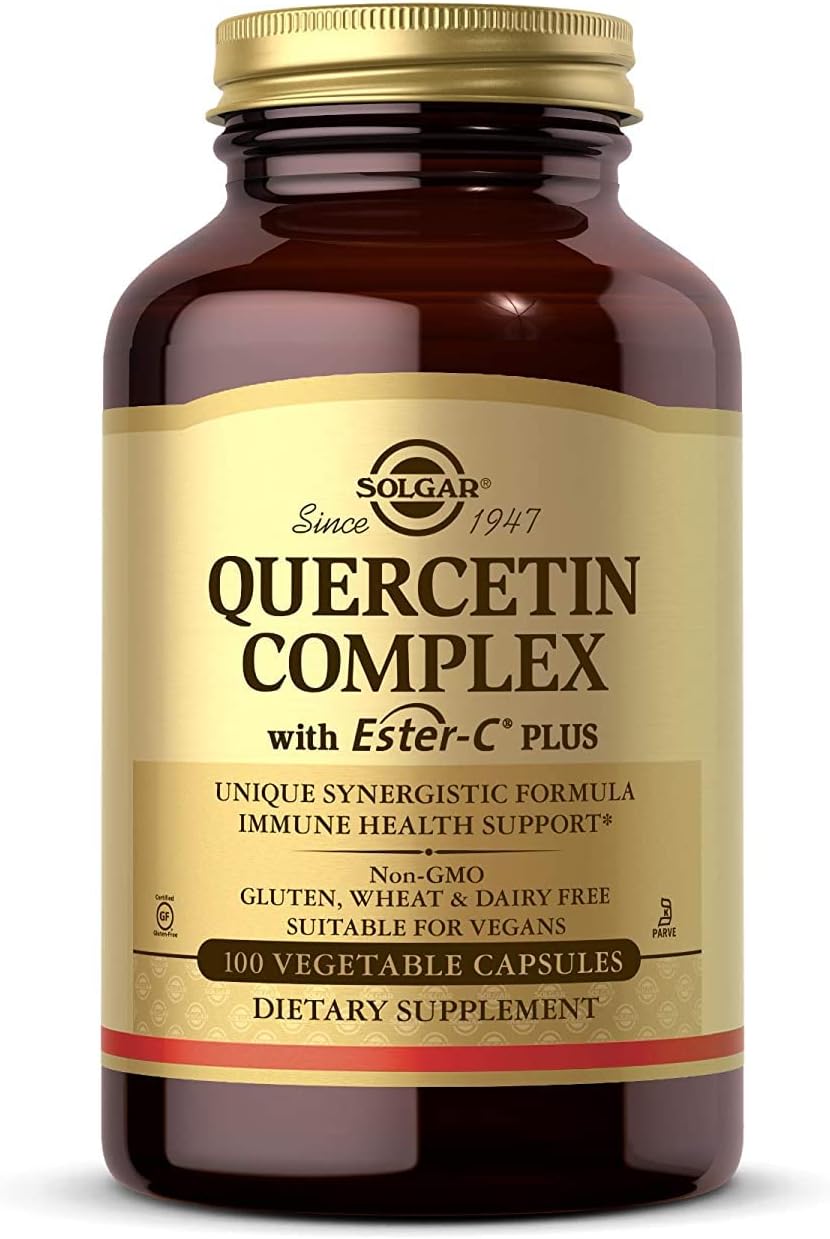
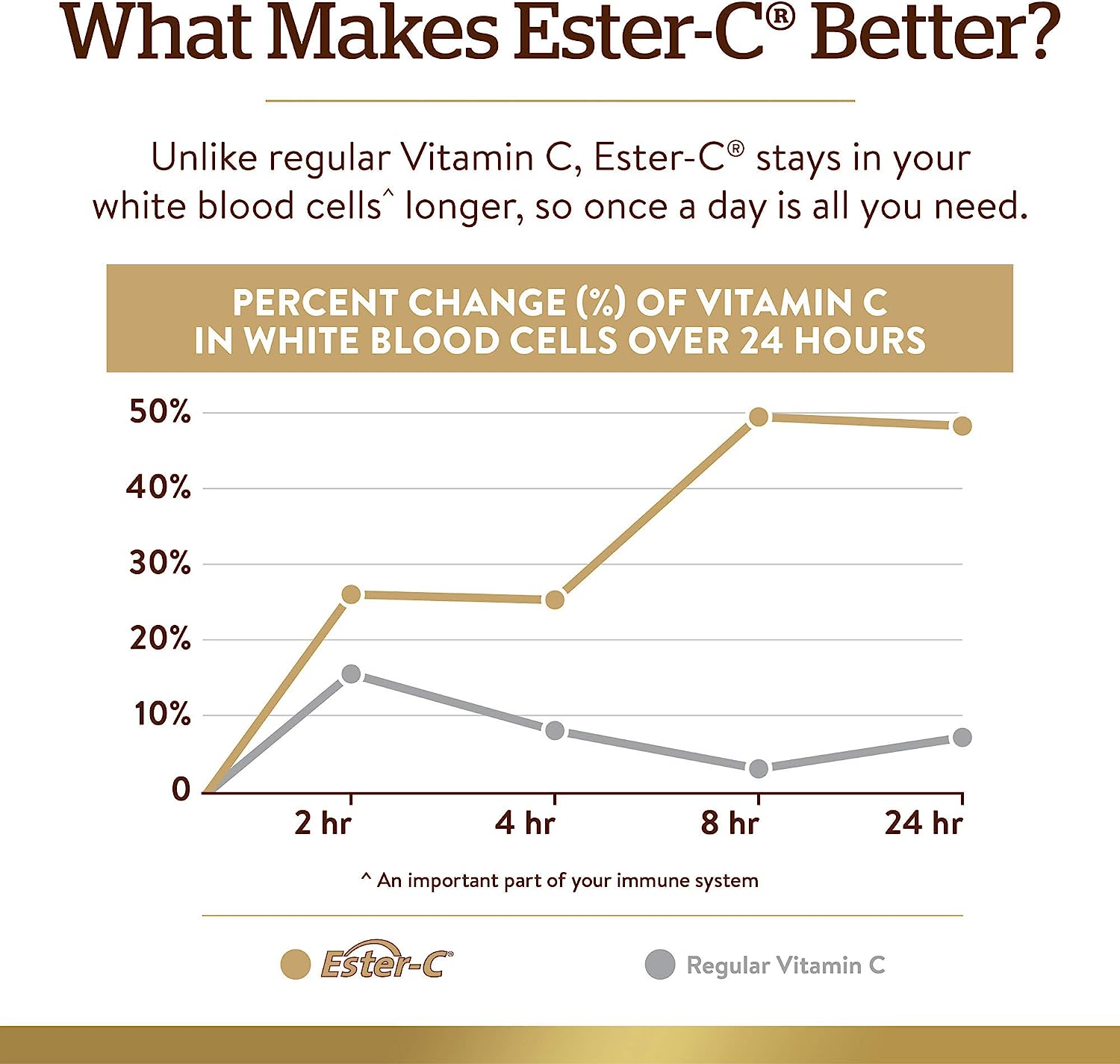
- Has antioxidant properties which help to stabilize cell membranes
- Product Note: Exposure to heat or sunlight may lead to melting/damage of product. Hence customers are expected to be available during the product delivery
- PH neutral (non acidic), form of vitamin C that is gentle on the stomach
- Offers the additional benefits of incorporating acerola berry, citrus bioflavonoids, rutin and rose hips and also features bromelain
Most FAQs about Quercetin:
What is Quercetin?
Quercetin is a natural plant compound classified as a flavonoid, which is a type of antioxidant found in various fruits, vegetables, and grains. It is commonly found in foods such as onions, apples, berries, citrus fruits, grapes, broccoli, and leafy greens. Quercetin is known for its potential health benefits and has been the subject of numerous scientific studies.
Here are some key characteristics and potential health effects of quercetin:
Antioxidant Properties: Quercetin acts as an antioxidant, helping to neutralize harmful free radicals in the body. Free radicals are unstable molecules that can cause oxidative stress and damage cells, potentially contributing to various health conditions.
Anti-Inflammatory Effects: Quercetin has been shown to possess anti-inflammatory properties. It may help reduce inflammation by inhibiting the production of inflammatory molecules and enzymes in the body. This anti-inflammatory activity may be beneficial for individuals with chronic inflammatory conditions.
Immune System Support: Quercetin has been studied for its potential immune-modulating effects. It may help support immune system function by regulating the activity of immune cells and promoting a balanced immune response.
Cardiovascular Health: Some research suggests that quercetin may have beneficial effects on cardiovascular health. It may help improve blood vessel function, reduce blood pressure, and lower LDL cholesterol levels (the "bad" cholesterol). These effects may contribute to a reduced risk of cardiovascular diseases.
Allergy Relief: Quercetin has been investigated for its potential to alleviate allergy symptoms. It may help stabilize mast cells, which release histamine during an allergic reaction, thereby reducing symptoms like nasal congestion, sneezing, and itching.
Cognitive Function: Preliminary studies suggest that quercetin may have neuroprotective effects and could potentially support cognitive function. It may help protect brain cells from oxidative stress and inflammation, which are associated with cognitive decline and neurodegenerative diseases.
Exercise Performance: Quercetin has also been explored for its potential benefits in exercise performance. Some research suggests that it may improve endurance, reduce fatigue, and enhance mitochondrial function in muscle cells.
Quercetin is available as a dietary supplement in various forms, including capsules, tablets, and powders. It is important to note that while quercetin is generally considered safe, high doses may have potential side effects and interact with certain medications.
It is advisable to consult with a healthcare professional before starting any new supplements, especially if you have specific health conditions or are taking medications.
It is worth noting that consuming a varied and balanced diet rich in fruits, vegetables, and whole foods is generally the best way to obtain the benefits of quercetin, as these sources provide a combination of nutrients and other bioactive compounds that work synergistically for optimal health.
What is Quercetin Used for?
Quercetin, a natural flavonoid compound, has a wide range of potential uses and applications. Here are some common areas where quercetin is used:
Allergy Relief: Quercetin is often used as a natural remedy to alleviate symptoms associated with allergies, such as sneezing, itching, congestion, and watery eyes. Its anti-inflammatory properties and ability to stabilize mast cells may help reduce the release of histamine, thereby mitigating allergic reactions.
Anti-Inflammatory Support: Due to its potent anti-inflammatory properties, quercetin is utilized to support the management of various inflammatory conditions. It may assist in reducing inflammation associated with arthritis, inflammatory bowel disease (IBD), and other inflammatory disorders.
Immune System Enhancement: Quercetin is known for its immune-modulating effects, which can help strengthen the immune system. By regulating immune responses and supporting immune cell function, quercetin may contribute to better overall immune health and resilience against infections.
Cardiovascular Health: Quercetin has been studied for its potential cardiovascular benefits. It may help improve blood vessel function, reduce blood pressure, and lower LDL cholesterol levels. These effects are important for promoting heart health and reducing the risk of cardiovascular diseases.
Cognitive Support: Some research suggests that quercetin may play a role in supporting cognitive function and brain health. Its antioxidant and anti-inflammatory properties may help protect brain cells from oxidative stress and inflammation, potentially reducing the risk of cognitive decline and neurodegenerative disorders.
Exercise Performance: Quercetin has been investigated for its potential effects on exercise performance and endurance. It may help improve mitochondrial function in muscle cells, reduce exercise-induced oxidative stress, and enhance stamina. However, more research is needed to fully understand its impact on athletic performance.
Skin Health: Quercetin's antioxidant and anti-inflammatory properties make it beneficial for skin health. It may help protect the skin against oxidative damage caused by environmental factors and reduce inflammation associated with skin conditions like eczema and dermatitis.
It's important to note that while quercetin shows promise in these areas, further research is still needed to fully establish its effectiveness and optimal usage.
How Much Quercetin Should I Take for Allergies?
The appropriate dosage of quercetin for allergies can vary depending on various factors, including the severity of symptoms, individual response, and overall health.
Since quercetin is available as a dietary supplement, it's important to follow the recommended dosages provided by the manufacturer or consult with a healthcare professional for personalized advice. They can take into account your specific situation and guide you on the appropriate dosage for your allergies.
That being said, the typical dosage range for quercetin supplements used for allergies is approximately 500 to 1,000 milligrams (mg) taken two to three times daily with meals. However, it's crucial to start with a lower dosage and gradually increase it as tolerated to assess your individual response and minimize the risk of any potential side effects.
It's worth noting that quercetin is often combined with other compounds, such as bromelain (a pineapple enzyme) or vitamin C, as they may enhance its absorption and efficacy. Therefore, combination products may have different recommended dosages, and it's important to carefully read and follow the instructions provided.
While quercetin is generally considered safe, it can interact with certain medications, including blood thinners and antibiotics. Therefore, it's essential to consult with a healthcare professional before starting quercetin supplementation, particularly if you have any underlying health conditions or are taking medications, to ensure it is safe and appropriate for you.
Remember, it's always best to seek personalized advice from a healthcare professional who can consider your specific circumstances and provide tailored recommendations for your allergies.
Conclusion
Quercetin, a powerful flavonoid, offers numerous health benefits due to its antioxidant, anti-inflammatory, and immune-modulating properties. By incorporating quercetin-rich foods into your diet, such as onions, apples, berries, citrus fruits, and leafy greens, you can enjoy the benefits of this remarkable compound.
Quercetin supplements may also be considered under professional guidance. Embrace a balanced diet and consult with healthcare professionals to optimize your well-being and harness the potential advantages of quercetin.
Be Healthy and Happy!
Relevant Reads>>>


